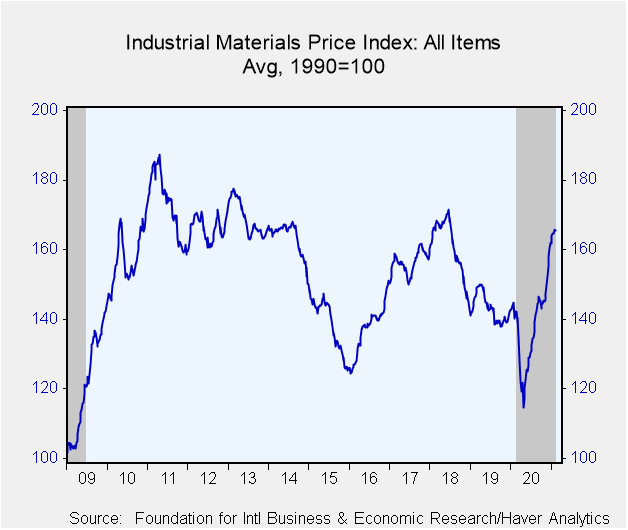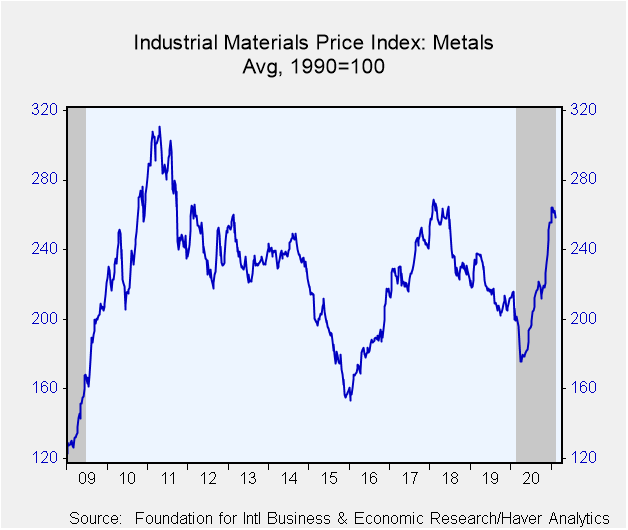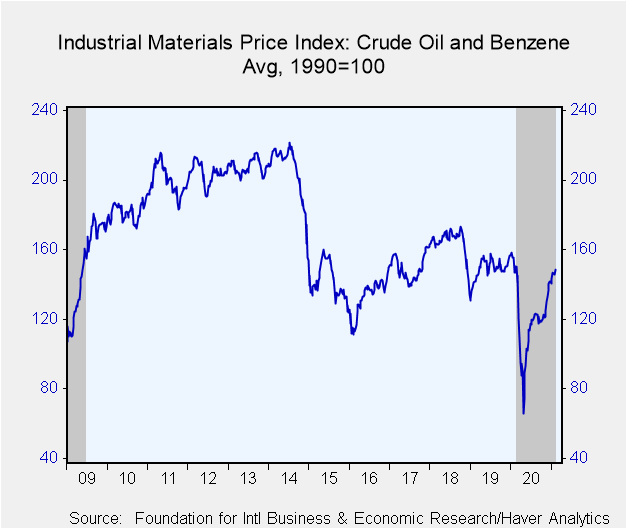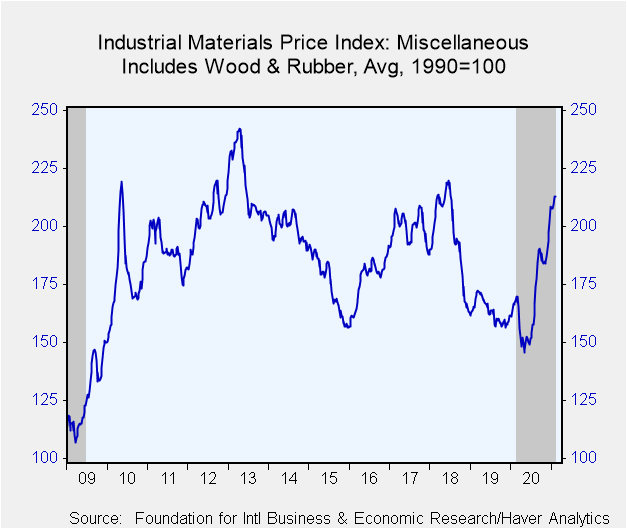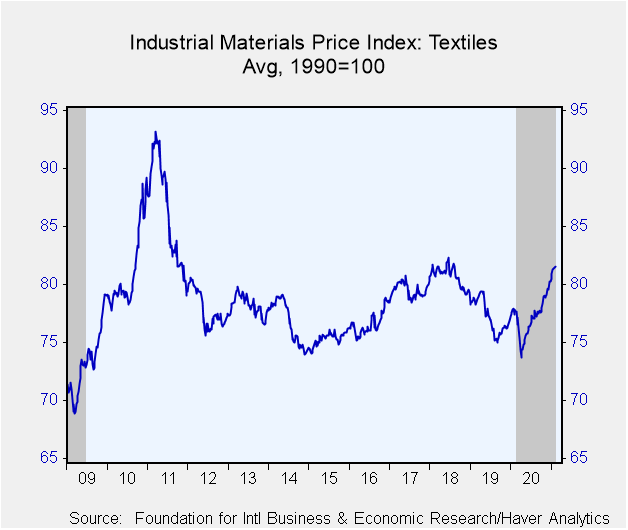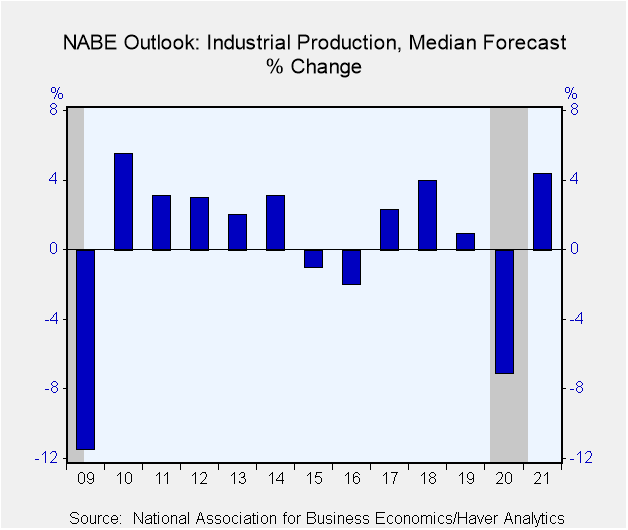 Global| Feb 08 2021
Global| Feb 08 2021FIBER: Industrial Commodity Price Strength Diminishes
by:Tom Moeller
|in:Economy in Brief
Summary
• Metals prices decline. • Price gains elsewhere continue. The Industrial Materials Price Index, from the Foundation for International Business and Economic Research (FIBER), increased a modest 0.9% during the four weeks ended [...]
• Metals prices decline.
• Price gains elsewhere continue.
The Industrial Materials Price Index, from the Foundation for International Business and Economic Research (FIBER), increased a modest 0.9% during the four weeks ended February 5 compared to double-digit growth in the last six months.
Earlier price strength in the metals group waned as prices fell 2.2% during the last four weeks, led lower by a 12.3% decline in steel scrap prices. Zinc prices also weakened 8.0% in four weeks (+16.1% y/y). The price of copper scrap fell 1.5% in the last four weeks while aluminum prices fell 2.0%. Lead prices eased 0.7% (+8.3% y/y).
To the upside, prices in the crude oil & benzene group rose 3.8% during the last four weeks. A 10.4% rise in crude oil prices to $54.69 per barrel paced the increase. Excluding crude oil, industrial commodity prices edged 0.3% higher in the last four weeks and 18.6% higher during the last year. Prices of the petro-chemical benzene held steady during the last month (-6.1% y/y).
Prices rose 2.4% in the miscellaneous group during the last four weeks. Framing lumber costs surged 10.3% with the strength in new home construction, but natural rubber prices fell 4.1%. Plywood prices have been unchanged since December 2019.
Prices in the textile group edged 0.7% higher in the last four weeks as cotton prices rose 3.2%. The cost of burlap, used for sacks, bags and gardening, improved 1.9% in the last four weeks (19.5% y/y).
Industrial commodity prices should continue to find support in the near future. Forecasts from the National Association for Business Economics call for a 4.4% rise in industrial output during 2021, following a 7.1% decline in production last year.
The Foundation for International Business and Economic Research (FIBER) develops economic measurement techniques as applied to business cycles and inflation in the U.S. and other market economies. The commodity price data can be found in Haver's DAILY, WEEKLY, USECON and CMDTY databases.
| FIBER Industrial Materials Price Index (%) | 4-Week | 3-Month | 6-Month | 12-Month | 2020 | 2019 | 2018 |
|---|---|---|---|---|---|---|---|
| All Items | 0.9 | 13.6 | 18.8 | 17.9 | 13.5 | 1.1 | -12.0 |
| Excluding Crude Oil | 0.3 | 11.9 | 18.0 | 18.6 | 16.0 | -0.6 | -11.1 |
| Textiles | 0.7 | 3.3 | 4.8 | 5.3 | 3.9 | -1.6 | -2.8 |
| Cotton (cents per pound) | 3.2 | 19.0 | 30.6 | 22.9 | 11.6 | -6.6 | -9.2 |
| Metals | -2.2 | 16.9 | 21.4 | 29.3 | 20.4 | -4.3 | -12.2 |
| Aluminum ($ per metric ton) | -2.0 | 6.2 | 15.8 | 16.6 | 13.1 | -6.5 | -12.7 |
| Copper Scrap (cents per pound) | -1.5 | 15.9 | 21.1 | 38.5 | 26.9 | 3.5 | -16.1 |
| Steel Scrap ($ per ton) | -12.3 | 38.9 | 44.4 | 55.7 | 43.6 | -0.8 | 2.3 |
| Crude Oil & Benzene | 3.8 | 22.7 | 21.2 | 1.2 | -9.7 | 20.2 | -20.0 |
| Crude Oil (WTI, $ per Barrel) | 10.4 | 45.1 | 32.2 | 6.8 | -21.4 | 35.5 | -24.4 |
| Miscellaneous | 2.4 | 15.1 | 27.6 | 28.1 | 29.1 | -0.0 | -14.8 |
| Framing Lumber ($ per 1000 board ft.) | 10.3 | 83.4 | 62.3 | 131.9 | 113.5 | 22.6 | -23.1 |
| Natural Rubber (cents per pound) | -4.1 | -13.5 | 27.4 | 42.4 | 48.6 | 10.7 | -4.1 |
Tom Moeller
AuthorMore in Author Profile »Prior to joining Haver Analytics in 2000, Mr. Moeller worked as the Economist at Chancellor Capital Management from 1985 to 1999. There, he developed comprehensive economic forecasts and interpreted economic data for equity and fixed income portfolio managers. Also at Chancellor, Mr. Moeller worked as an equity analyst and was responsible for researching and rating companies in the economically sensitive automobile and housing industries for investment in Chancellor’s equity portfolio. Prior to joining Chancellor, Mr. Moeller was an Economist at Citibank from 1979 to 1984. He also analyzed pricing behavior in the metals industry for the Council on Wage and Price Stability in Washington, D.C. In 1999, Mr. Moeller received the award for most accurate forecast from the Forecasters' Club of New York. From 1990 to 1992 he was President of the New York Association for Business Economists. Mr. Moeller earned an M.B.A. in Finance from Fordham University, where he graduated in 1987. He holds a Bachelor of Arts in Economics from George Washington University.
More Economy in Brief
 Global| Feb 05 2026
Global| Feb 05 2026Charts of the Week: Balanced Policy, Resilient Data and AI Narratives
by:Andrew Cates


